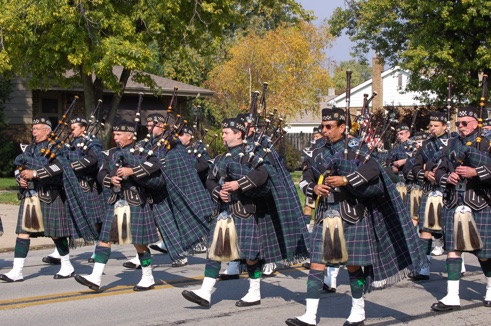A bunch of us retired cops got together the other day and the subject of bagpipes, “Amazing Grace,” and an “Inspector’s Funeral” came up.
An Inspector’s Funeral includes an honor guard, a large police uniform presence with officers from all over the state and beyond attending. This followed by a procession to the cemetery with hundreds of patrol cars following. We pretty much agreed that the new York City Police Department (NYPD) deserves the distinction of creating the Inspector’s Funeral. Somewhere along the line, a piper will play “Amazing Grace.” A lot of Americans probably are unaware that there are other tunes that lend themselves to bagpipes.
This might lead some to ask, why bagpipes, especially Scottish bagpipes. Most police historians attribute the bagpipes at Amerian police funerals to the potato famine in Ireland. The famine caused a large Irish immigration to America. The Irish were not welcomed to their new country, they were regarded as dumb as a box of rocks, habitual drunkards, and troublemakers. It was not unusual to see signs stating: “NO IRISH,” at places of employment. They could be trained to use a pick and shovel and had strong backs, if one couldn’t find a negro, an Irishman would do.
One thing in the Irishman’s favor, if he was kept sober (relatively) and kept his mouth shut there was a slight opportunity for advancement. The time of the famine 1845-49 coincided with the creation of the New York City Police Department (1845) and expansion of the Boston Police Department (1845-50). The job of a police officer was not well regarded. This gave the Irish the in that they were looking for. Tammany Hall had been around since colonial times. The leaders of Tammany Hall recognized the Irish as a potential power base and in 1854 actively courted the Irish. This translated to more jobs, especially in the Municipal sector. Soon thereafter, fraternal organizations followed, “The Emerald Society.” Most major police departments have a branch of the Emerald Society, that typically includes a band component, pipes, and drums.
Here is a little-known fact, in America. Bagpipes were considered to be a weapon of war up until 1995. Here is the story.
Bagpipes – A Weapon of War!
 It’s interesting to learn that until 1996 the bagpipes were classified as a weapon of war. This does not simply mean an instrument played in battle, or a tool used to direct troops, it actually means a physical weapon, like a sword or a musket. The origins of this take us all the way back to the Battle of Culloden and a piper named James Reid.
It’s interesting to learn that until 1996 the bagpipes were classified as a weapon of war. This does not simply mean an instrument played in battle, or a tool used to direct troops, it actually means a physical weapon, like a sword or a musket. The origins of this take us all the way back to the Battle of Culloden and a piper named James Reid.
James Reid was one of the several pipers who played at the Battle of Culloden. He was captured along with 558 men by Cumberland’s troops and taken to England. There James was put on trial and accused of high treason against the English Crown. Piper Reid claimed that he was innocent because he did not have a gun or a sword. He said that the only thing he did that day on the battlefield was play the bagpipe.
After some deliberation, the judges had a different opinion on the matter. They said that a Highland regiment never marched to war without a piper at its head. Therefore, in the eyes of the law, the bagpipe was an instrument of war. James Reid was condemned and subsequently hanged then drawn and quartered.
The decision of those judges has echoed down through the generations. It was the first recorded occasion that a musical instrument was officially declared a weapon of war. For hundreds of years and many conflicts to come the bagpipes, when listed among the items captured in combat, was counted among rifles, sabers, and munitions. It is interesting to note that bugles and drums were recorded as musical instruments, where the bagpipe ranked among the lists of weapons. This continued through the Great War. Perhaps a fitting place for the pipes, but a tragic legacy for the piper James Reid who played at the last bloody battle of the Jacobites on Culloden Moor.
In 1996, after some disputes with authorities, a man known as Mr. Brooks was taken to court for playing the pipes on Hamstead Heath, an act forbidden under a Victorian by-law stating the playing of any musical instrument is banned. Mr. Brooks plead not guilty by, claiming the pipes are not a musical instrument, but instead a weapon of war, citing the case of James Reid as a precedent. The unanimous verdict was that the pipes are first and foremost musical instruments returning them from a weapon of war to their rightful place as a musical instrument.
I wouldn’t mind the pipes playing over me, as long as it wasn’t “Amazing Grace.” I heard a number one night, but I didn’t get the name and haven’t been able to find it since. All I can recall is that a Lord had died (don’t know whether it was Scot or Irish) and the tune was to let Saint Peter know that a warrior was on his way to heaven and that he best have the gates open. It was played on pipes and drums and wasn’t so much a request as a demand. It would certainly stir up one’s followers while making an enemies blood run cold.
This song is probably the reason most bagpipe funeral songs are played outside the church.
Sure wish I could find that song.
